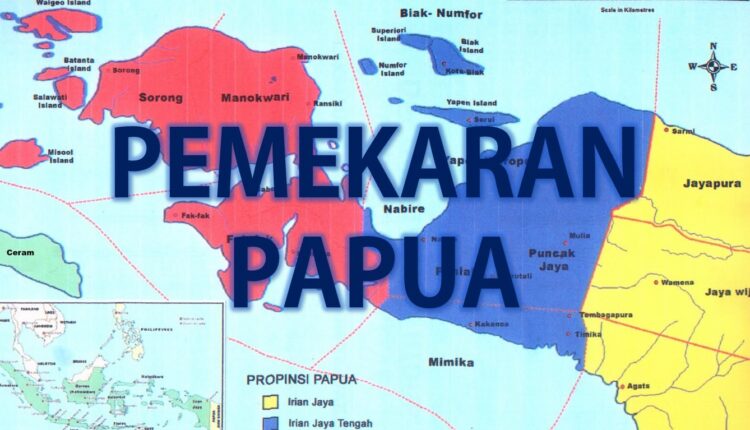DOB Papua for the Interests of National Integration
By: Rebecca Marian)*
The New Autonomous Region (DOB) for Papua is an idea that has long been championed. The implementation of new autonomous regions in Papua is intended to realize the interests of national integration.
Frans Maniasi, an observer of Papuan Politics, said that the idea of expanding the province of Papua through the Papua New Guinea, historically can be traced back to the 1980s.
This assertion was conveyed by Frans Maniagasi in a virtual discussion held by the Merdeka Barat 9 Forum (FMB9) with the theme “Regional Expansion for Indigenous Papuans”. On Monday 27 June 2022. The discussion was attended by Deputy V of the Presidential Staff Office, Jaleswari Pramodharwani and the Chair of the Papuan Indigenous Peoples Institute Lenis Kogoya.
In the beginning of his presentation, Frans said, there were three things, firstly that this new autonomous region was not new. At that time, Frans said, three deputy governors were formed based on region, namely 1 in the south, one in the middle and the other for the west.
After the 2001 Special Autonomy Law was issued, Megawati Soekarnoputri as President of the Republic of Indonesia at that time, accelerated the formation of West Irian Jaya Province or what is now known as West Papua Province. In addition, whatever is carried out in Papua, the interests of the nation must be prioritized for the sake of national integration.
According to Frans, there are two dimensions in viewing the Papua New Guinea. The first is the philosophical dimension. This is the process of decentralization that causes democratization at the lower levels. This means that local governments are given the authority to regulate their own regions within the framework of the Indonesian nationality.
From the sociological aspect, 20 years after the 2001 Papua Special Autonomy Law was enacted, there are still shortcomings. Although there are also progress felt by the people of Papua. Frans personally admits that after the 2001 Special Autonomy Law, there has been progress in Papua. This can be felt regardless of the advantages and disadvantages.
In addition, Frans said, there has been extraordinary progress in strategic structural positions starting from the position of Governor to Head of District which is held by Papuans themselves.
Frans also explained, for example, that there are good transportation facilities, where people can move from remote places, from the mountains, from the coast to cities and vice versa also from cities to villages. However, he also reminded that the acceleration of development that promises prosperity for the community is not expected to exclude indigenous Papuans. So that the acceleration of development will not be counterproductive to its objectives.
Third, Frans explained related to government regulation number 106 of 2021 regarding institutions. In PP 106/2021, he continued, a body was formed, namely the Steering Committee for the acceleration of Special Autonomy development which was directly under the Vice President.
The institution is the granting of total authority from the Central Government to the Provinces and City Regencies to administer the regions, administer the regions, and manage the people as stated in 106. This is something that deserves to be appreciated.
Frans also emphasized that all elements of society need to realize that new autonomous regions are a policy to bring people closer to prosperity. Of course to achieve this goal, collaborative work is needed.
On a different occasion, Nono Sampono as Deputy Chair of the Indonesian Regional Representative Council (DPD), ensured that he would fully support the wishes and aspirations of the community related to the formation of new autonomous regions. Nono admitted that he had conveyed to the Vice President as Chairman of the Regional Autonomy Council to reopen the faucet for adding new autonomous regions. DPD itself as a regional representative is also preparing a study with a focus on the need to reopen new autonomous regions.
Nono assessed that there were 173 new autonomous regions proposed in the DPD. To determine the area that can become a new area, a thorough study will be carried out taking into account the budget burden.
Previously, the head of the MeePago tribe, Hans Mote, stated that he strongly agreed and would give full support to the government for the expansion of the new autonomous region in Papua.
With the expansion of this new autonomous region, it is hoped that Papua will become more advanced and its development evenly distributed in every line so that the people can also advance.
In line with Hans Mote, Ondofolo Yanto Eluay who is a traditional Tabi leader also supports the government’s plan for the expansion of the new Autonomous Region in Papua. The new autonomous regions must be taken seriously, moreover this concerns the interests of the Indonesian people, especially those living in the eastern region, which does have different challenges than Indonesia in the region.
)* The author is a Papuan student living in Jakarta
